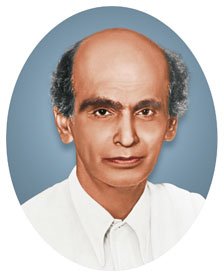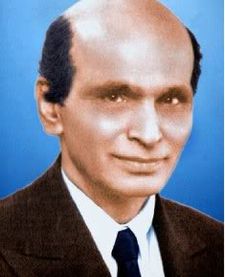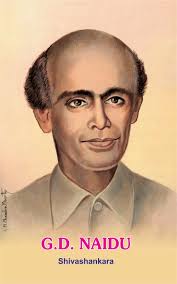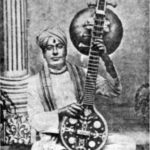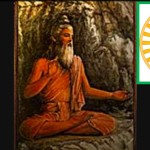As with the venerable Syama Saastri, one of the 3 great Carnatic composers, a number of Telugu-speaking figures often made their way to, or were born in Tamil Nadu. While this does not take away from their birth in that important state, it is also a matter of veracity to verify their Andhra antecedents. One such figure is famous throughout Coimbatore, even the rest of the pradesa of the Tamizh, but not as well-known in the land of his forebears.
The next article in our Continuing Series on Telugu Personalities is known as ‘Miracle Man’: G.D. Naidu.
Background
Gopalaswamy Doraiswamy Naidu was born in Tamil Nadu to a Telugu-speaking couple, in March 23, of the year 1893 CE. [2] Hailing from a farming family, in the village of Kalangal (Madras Presidency), he lost his mother at an early age. The young Naidu nevertheless rose from adversity to attain tremendous achievement over the course of his long life.
Initially working on the family plot, it is said that he left home after noticing the motorcycle of the local colonial revenue inspector. With only a 3rd standard education, his career began at age 16, as a restaurant worker, near a Coimbatore railroad. It took him 3 years, but he eventually managed to purchase a motorbike; however, in a fit a curiosity, he dismantled it to study its internal structure. He then began working as a mechanic, before moving to Mumbai (then Bombay Presidency) to set up a cotton business. When this failed, G.D. returned to Coimbatore. Soon he began assisting a british industrialist named Robert Stanes. [2] Scrupulously saving up money, Naidu later managed to buy his first bus upfront in 1921, through a loan from his patron. This soon ballooned to 23 by 1924. He had 280 buses by 1933, and his United Motor Service attained national renown. The tables were now turned, and the native Indian now had Englishmen as his employees. [3]
He eventually traveled to London and New York to study the bus systems there. Cleanliness became the m.o. not only for the owner, but for the humble desk clerk and bus driver alike. A notable story relates that a visiting German couple to Colonial Coimbatore decided to leave their hotel and stay at his bus terminal instead—so clean and accommodating were his accommodations. At the height of his tenure, he had 1000 employees. [3]
“The hardworking Naidu became a byword for diligence, cleanliness and punctuality.” [3]
“Universal Radiators Factory, Gopal Clock Industry, Coimbatore Diesel products and Coimbatore Engineering Private Limited, Coimbatore Armature Winding Works, UMS Radio Industry and Carbon manufacturing industry are some of the factories that he founded.” [2]
Dubbed the ‘Edison of India’ by people of the time, G.D. Naidu had numerous inventions to his credit. He passed away on January 4th, 1974, leaving behind 2 children. Despite his meteoric rise, ‘Miracle Man’ remained a humble man at heart.
“Not forgetting his roots, Naidu was actively engaged in farming activities as well and it is said that he grew millet and ten-feet-high cotton plants. Many people would visit his farm to study the high production and among them was Nobel Prize recipient for Physics, C V Raman.” [2]
Achievements
“Popularly known as the “Edison of India”, Gopalsamy Doraisamy Naidu has many firsts to his credit. He invented a wide range of products, researched on a basket of subjects, started skill education programmes, hosted freedom fighters, religious heads, industrialists, and national leaders in Coimbatore, and contributed for the growth of the city.” [1]
The contribution of G.D. Naidu to the Coimbatore Bus industry cannot be minimised. Starting from his first bus, to the later fleet of 23, he is regarded as its pioneer. The fact that this was achieved despite humble beginnings is proof of the value of hard work and perseverance. He had a vision, worked diligently to pursue, caught a lucky break, and capitalised on it. Notwithstanding his business accomplishments, G.D.Naidu was first and foremost an inventor at heart. He is credit with developing India’s first indigenous electric motor. Indeed, 100 other machines ranging from voting machines to coffee machines are said to have been built by him.
He was an autodidact & invention factory extraordinaire.
#GDNaidu, the self made Indian inventor and engineer who is also referred to as the Edison of India, was born #OnThisDay in 1893. pic.twitter.com/Sr9vwOJtEd
— Prasar Bharati प्रसार भारती (@prasarbharati) March 22, 2017
“Naidu retired from all his business-related activities in 1944 and embarked on the road of philanthropy. Two years later, he founded Industrial Labour Welfare Association (now known as G.D. Naidu Charities) with an aim to include practical training in higher education so that students would get employed easily.” [2]
Legacy
Today, the Vellore Institute of Technology bestows the G.D.Naidu Young Scientist Award. His name is known nationally as India’s answer to Edison. In recognition of Tesla’s genius, some have upgraded him to India’s Tesla. Hyperbole though that may be, the Hindu penchant for athisayokthi does not take away from the authentic, self-taught, mechanical genius that was G.D. Naidu. Showing the limits of theory in the face of practice, a man who was armed with only an incomplete primary school education was able to become an inventor, entrepreneur, and industrialist of sizable wealth.
His life is a testament to the exigency of dedication, hard work, and practical knowledge. The key to life is not just calculating the answer, but working to solve the problem. Gopalaswamy Doraiswamy Naidu was one such Telugu who solved numerous problems in Tamil land.
References:
- “G.D. Naidu Memorial Gallery Inaugurated”. The Hindu. https://www.thehindu.com/news/cities/Coimbatore/gd-naidu-memorial-gallery-inaugurated/article30481456.ece
- “G.D. Naidu”. The Better India. https://www.thebetterindia.com/199284/gd-naidu-coimbatore-tamil-nadu-edison-inventor-electric-motor-india/
- “Legacity – G.D. Naidu – The Auto Transport Man”. Simpli-city. http://simpli-city.in/articledetail.php?aid=778&isnotify=n
